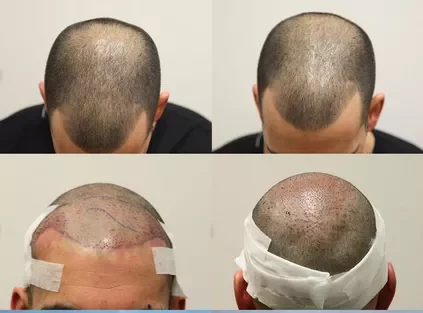Undergoing a hair transplant can be a life-changing procedure, offering a solution to hair loss and boosting self-confidence. However, post-surgery, patients often experience an itching scalp, which can be both uncomfortable and worrisome. Addressing this common issue is crucial to ensuring a smooth recovery and maintaining the health of the newly transplanted hair. This article explores the causes of scalp itching after a hair transplant and provides comprehensive strategies to alleviate this discomfort effectively.
Causes of Itching After Hair Transplant
1. Healing Process
The primary cause of itching after a hair transplant is the natural healing process. During surgery, small incisions are made in the scalp to transplant hair follicles. As these incisions heal, the body produces histamines, which can cause itching.
2. Dry Scalp
Post-transplant, the scalp may become dry due to the surgical procedure and the medications prescribed. A dry scalp can lead to flaking and itching.
3. Crust Formation
After the transplant, small crusts or scabs form around the hair grafts. As these scabs heal and eventually fall off, they can cause itching.
4. Inflammation
Inflammation is a natural response to surgery. The scalp may be swollen and red, contributing to itching.
5. Allergic Reactions
Some patients might experience allergic reactions to medications or topical treatments used during the recovery process, leading to itching.
6. Infection
Though rare, infections can occur post-transplant, leading to redness, swelling, and itching.
Preventive Measures Before and After Surgery
Pre-Surgery Preparation
1. Consultation with the Surgeon
- Discuss any allergies or sensitivities to medications.
- Follow any prescribed scalp treatments to prepare the scalp for surgery.
2. Scalp Hygiene
- Maintain a clean scalp to reduce the risk of infection.
- Avoid any harsh treatments or chemicals on the scalp before surgery.
Post-Surgery Care
1. Follow Post-Operative Instructions
- Adhere strictly to the surgeon’s guidelines regarding washing and caring for your scalp.
- Use prescribed medications and topical treatments as directed.
2. Gentle Washing
- Use mild, non-irritating shampoos recommended by your surgeon.
- Avoid scrubbing or scratching the scalp.
3. Moisturizing the Scalp
- Use a gentle, surgeon-approved moisturizer to prevent dryness.
- Apply moisturizer as directed to maintain hydration and reduce itching.
4. Avoiding Irritants
- Stay away from hair products containing alcohol, fragrances, or harsh chemicals.
- Avoid exposure to direct sunlight and wear a hat if necessary.
Effective Remedies to Stop Itching
1. Cold Compress
Applying a cold compress can help reduce itching and swelling. Wrap ice in a clean cloth and gently apply it to the itchy areas for a few minutes.
2. Medicated Shampoos and Lotions
Use shampoos and lotions containing ingredients like aloe vera, tea tree oil, or hydrocortisone, as recommended by your surgeon. These can soothe the scalp and reduce inflammation.
3. Oral Antihistamines
Over-the-counter antihistamines can help manage itching caused by the release of histamines during the healing process. Always consult your doctor before taking any medication.
See Also: When Can I Wear a Wig After Hair Transplant?
4. Topical Steroids
In some cases, your surgeon may prescribe a mild steroid cream to apply to the scalp to reduce severe itching and inflammation.
5. Proper Hydration
Keeping your body well-hydrated helps maintain overall skin health. Drink plenty of water throughout the day.
6. Avoid Scratching
It’s crucial to resist the urge to scratch your scalp, as this can dislodge grafts and cause infection. Keeping your nails short can help reduce damage if you inadvertently scratch.
7. Scalp Massage
Gently massaging the scalp with fingertips can improve blood circulation and reduce itching. Be careful to avoid dislodging grafts.
8. Oatmeal Baths
An oatmeal bath can soothe the skin. Use colloidal oatmeal, which is finely ground, and soak the affected area to relieve itching.
9. Aloe Vera Gel
Aloe vera has natural soothing properties. Apply pure aloe vera gel to the itchy areas for relief.
10. Coconut Oil
Coconut oil can moisturize the scalp and reduce itching. Apply a small amount to the scalp and leave it on for a few hours before washing off.
11. Herbal Remedies
Certain herbs like chamomile and calendula have anti-inflammatory properties. Consult your surgeon before using any herbal remedies.
When to See a Doctor
While mild itching is a normal part of the healing process, persistent or severe itching may indicate an underlying issue. Contact your surgeon if:
- The itching is accompanied by severe pain, redness, or swelling.
- You notice any signs of infection, such as pus or an unpleasant odor.
- The itching persists despite following recommended treatments and home remedies.
Conclusion
Itching after a hair transplant is a common yet manageable aspect of the recovery process. Understanding the causes and implementing the appropriate remedies can significantly alleviate discomfort and promote a smooth recovery. Always follow your surgeon’s advice and maintain good scalp hygiene to ensure the best results from your hair transplant.
By taking proactive steps and utilizing the remedies discussed, you can minimize itching and focus on enjoying the benefits of your new hair growth. Remember, patience and proper care are key to a successful recovery and achieving the full potential of your hair transplant.


